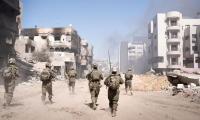KARACHI: While President Arif Alvi admitted that “people are worried about price-hike”, State Bank of Pakistan (SBP) Governor Reza Baqir assured the countrymen that foreign investment was coming to Pakistan, and there would be good news about strengthening of national economy soon.
Speaking at a dinner reception, hosted by Shahrukh Hasan of the Jang Group at his residence late on Sunday, the president said corruption and wrong decisions in the past were the main causes of economic crisis in the country and obstacles to economic growth. He said the government and institutions should be on the same page in the national interest, adding political stability was important for economic prosperity. “This is in the national interest that the military and civilian government remain on the same page. And they certainly are.”
SBP Governor Reza Baqir, Deputy High Commissioner of UK, Deputy Consul General of US, Consul General of Germany, along with officials of corporate sector attended the event.
President Alvi said, “Corruption and wrong policies are equally responsible for economic malaise.” He hoped that the incumbent government would succeed in putting the economy back on growth track.
“Economy is improving,” he claimed.
Alvi admitted that the government was compelled to accept ‘tough conditions’ of the International Monetary Fund (IMF). The country requested $6 billion of the IMF loan programme in April to avert an economic crisis. The incumbent administration took a score of measures to introduce exchange rate stability, leading to weakening of the rupee against the US dollar.
The IMF-backed reforms resulted in significant reduction in the current accountdeficit. In October, the current account posted surplus for the first time after four-and-a-half years. However, stabilisation measures made imports expensive and caused inflation.
President Alvi said the country had progressed with regards to foreign affairs since Prime Minister Imran Khan took oath. “But the outcomes are not desirable at the domestic front.”
Alvi said the prime minister respects the parliament, but he stopped attending the parliamentary sessions due to the opposition’s protest on his speech. “The government and opposition parties should work together for political stability.”
President Alvi said a meeting of the Council of Common Interests should be convened. He was unaware whether or not the meeting was convened.
There was general appreciation of the successes of the current government in terms of the country’s global image, but this was not reflected on the domestic front.
To a question about the Kartarpur Corridor, he said the decision was taken by the civilian administration. “The proposal has been under discussion for over a decade.”
Both the president and the governor central bank were of the firm opinion the tough decisions taken were inevitable given the precarious condition of the economy the current government inherited.
The president expressed the view that the economy was showing robust signs of recovery and positive results were becoming visible. He dispelled the impression that present media censorship was worse than during the Zia-ul-Haq regime. “Media freedom in Pakistan is much better than other countries… the media in Pakistan are freer than in India,” he said. Alvi said advertising spending was cut due to economic slowdown.
The president said social media is creating more problems than the electronic media. “Members of parliament and political parties don’t understand the significance of a bill,” he said, referring to proposed amendments into the cyber crime law.
Responding to a question about the prevailing confusion on whether or not Pakistanis could freely remit foreign currency abroad, Governor Baqir gave a detailed explanation of applicable laws as well certain conditions that the SBP had imposed with the intention of stemming the dollar outflow. “The economy is getting better, we have relaxed some restrictions on foreign exchange and will further relax them in the days to come,” the governor said.
Asked why a similar, staggered approach was not adopted with regard to the IMF conditions and instead the tough conditions were front loaded, he said the difficult situation warranted a harsher approach. “When the patient is in a critical condition, merely administering Paracetamol will not do.” The governor, however, agreed that the IMF conditions were harsh.
To a question regarding money laundering, the central bank governor responded that the bank informs the financial monitoring unit of finance ministry about suspicious transactions. “The State Bank cannot say how much of actual money laundering is taking place at the moment as money laundering is not done through banking channels,” the governor added.
However, he did agree hawala channels are being used for inward remittances of big amount. The reason for hawala channels being utilised is due to the huge margins/commissions the banks are charging. Some banks even charge two rupees on one dollar. The central bank is working to address this problem, he added.
On the occasion, journalists present expressed much concern over the pressure being exerted on the media.
Khawar Manika's counsel continued his arguments on Wednesday in a petition filed by Imran Khan and Bushra Bibi
IHC reserved judgment on the petition against registration of cases against former interior minister Sheikh Rashid on...
Saudi woman who was reportedly kidnapped from Islamabad’s residential Sector F-8 in mysterious circumstances, has...
Pakistan Navy warship rescued 8 Iranian fishermen after their boat caught fire in the open sea
SC dismissed appeal against SHC order that turned down application of partner seeking extension of time to furnish...
Executive board of International Monetary Fund will meet on April 29 to discuss the approval of $1.1 billion funding...







